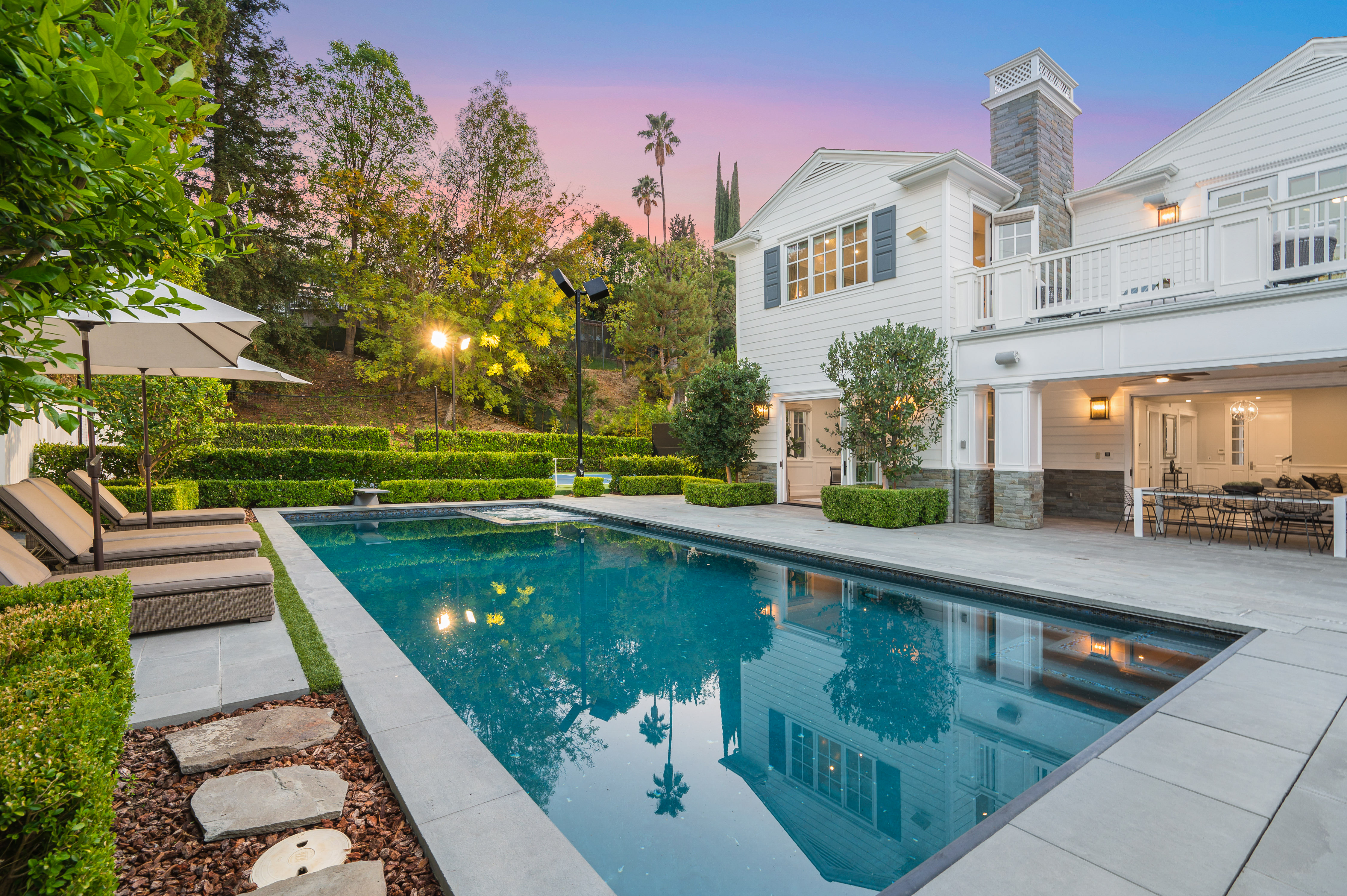
A pool can help you cool off and relax, but it’s important to plan for in-ground pool costs in Los Angeles. Here are the factors that affect the cost.
Weigh the pros and cons of these popular pool materials before you take the plunge


Gunite pools require more maintenance but can last four times as long as fiberglass.
Fiberglass pools limit customization because they’re usually pre-built in a factory.
Some homeowners prefer the smoother feeling of fiberglass under their feet.
Installing a pool is a great way to add value to your home and provide some outdoor fun for your family. But when it comes to building the pool, understanding the differences between gunite vs. fiberglass pools is a good place to start to make sure you get the final product you’re looking for. These two types of pools are installed differently and have different costs and maintenance requirements. Our guide breaks it all down so you can decide where a fiberglass or gunite pool will suit your needs better.
The biggest difference between fiberglass and gunite pools is the construction. Fiberglass pools are made from a pre-built fiberglass shell, while gunite pools are made from gunite—which is similar to concrete—that your pool installer will build on-site.
Fiberglass pools are easier and faster to install and provide a smooth surface under your feet that resists algae. Gunite pools, meanwhile, can be fully custom creations that last 100 years or more—about four times as long as a fiberglass pool.
A gunite pool has a shell that consists of gunite, a material similar to concrete that lacks the large aggregate in concrete and provides a smoother, more durable finish. During construction, your local swimming pool installation company will create the shell of your pool by shooting the concrete-like material through a hose into the excavated area, usually over a rebar form, and then smoothing out the surface using hand tools.
| Pros | Cons |
|---|---|
| 100-year lifespan | Rough surface can hold algae |
| Custom-built | Expensive |
| Highly durable | Challenging installation |
Best for:
Homeowners with custom pool ideas in mind
Pools that you want to last a lifetime
Homeowners who don’t mind extra maintenance in exchange for longevity
Gunite pools come with quite a few upsides, which keeps them relevant despite the high installation cost.
The most significant benefit of installing a gunite pool is the customizability. Your professional will construct the pool on site, so nothing is out of the question, including special shapes, styles, or add-on features like set-in hot tubs or built-in steps. The only limit to the design is your imagination.
Another major benefit to gunite pools is the durability and longevity they provide. Much like concrete, gunite will last for many decades, often around 100 years. The longevity also helps add value to your home, so gunite pools can provide a more impressive return on investment in many cases.
Of course, gunite pools aren’t without their drawbacks. Most importantly, the cost to build a pool out of gunite is significantly higher than with a fiberglass pool. The construction process all happens on-site and requires highly skilled gunite pool installers and many days of work.
On average, gunite pools cost around $100,000, which is more than three times as much as a fiberglass pool, which averages around $31,000. Even at the lower end of the installation cost range, gunite is going to be more expensive. For example, the cost of installing a plunge pool made of gunite might cost $50,000, whereas a fiberglass plunge pool could be as low as $5,000.
In addition to the high upfront cost, gunite pools also require more maintenance, which either costs time or money. The rough, porous surface makes it more prone to algae build-up, which means you’ll have to do more frequent pool cleaning. While gunite lasts longer, you also might need to pay for crack repair or surface damage over the many years your pool is in service.
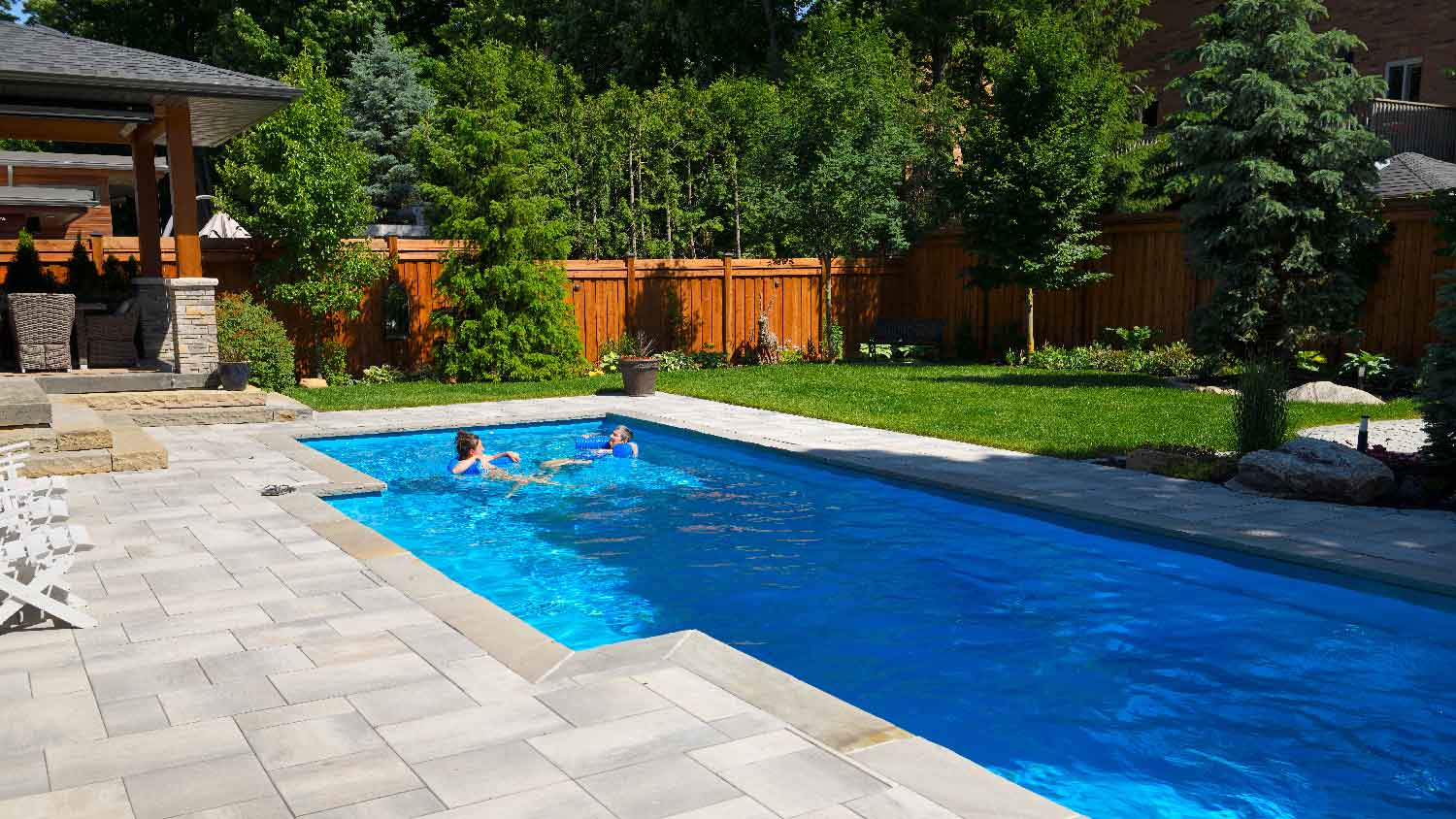
A fiberglass pool consists of a shell made of fiberglass that your installer sets into the ground. Your pool company will typically pre-build the shell in a factory and then deliver and install it in your yard. The material is smoother than gunite, which means it can be more comfortable on your feet and is less prone to algae build-up. However, fiberglass pools last a much shorter time—usually between 20 and 30 years.
| Pros | Cons |
|---|---|
| Less maintenance required | Adds less home value |
| Much more affordable | Much shorter lifespan |
| Smoother surface for comfort | Minimal customization |
Best for:
Homeowners with a limited budget
Homeowners who want to do minimal pool maintenance and cleaning
Homes with kids who will find the material more comfortable
Fiberglass pools are more common in most areas because they’re affordable and faster to install. The lower cost of a fiberglass pool is one of the most appealing aspects, as they usually cost about a third of what a similarly-sized gunite pool would. They also take just a few days to install, whereas a gunite pool can take a month or more to cure before it’s ready to use.
Fiberglass is significantly smoother than gunite, which means two things for you as the owner. First, the surface is generally more comfortable to walk on, which might be especially important if you have children. Second, the smooth, non-porous surface helps limit algae accumulation, so a fiberglass pool won’t require as much cleaning or maintenance.
Fiberglass pools might be more affordable, but they also won’t last nearly as long as a gunite pool. A fiberglass pool has a typical lifespan of 20 to 30 years, whereas a gunite pool can last 100 years or more with proper maintenance. The limited lifespan also typically means a fiberglass pool won’t add as much to your home value as one made of gunite.
Fiberglass pools are also less customizable because your installer will construct the shell in a factory, usually using pre-set molds. You can find pool companies that can customize some aspects, but generally speaking, you’ll be locked into specific designs offered by your installer.
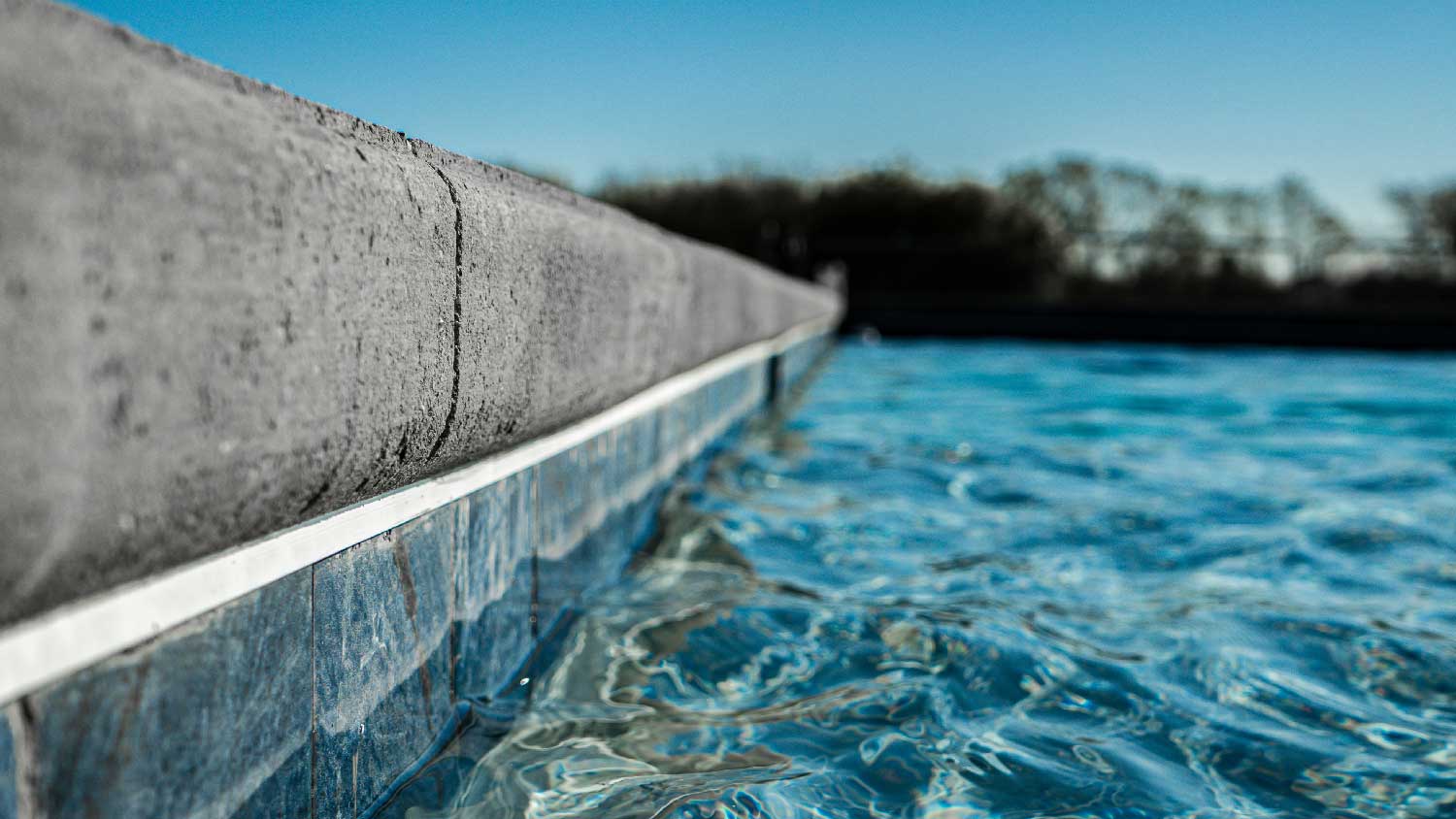
When choosing between a gunite vs. fiberglass pool, it’s important that you consider all of the areas where the two differ so that you know which will serve you best now and in the future. Be sure to weigh the following factors when making your decision:
Fiberglass and gunite pools can both look equally beautiful. The appearance of your pool has more to do with the quality of the installation, the deck or patio surrounding the pool, and its cleanliness than it does with the construction material.
Gunite pools offer far more in the way of customization. When you install a fiberglass pool, most installers will limit you to molds that their factory or supplier can accommodate, so you’ll more often be choosing from a pre-set list of designs. With gunite, your installer constructs your pool on-site and largely by hand. Your only limitation to design and customization options is your own vision for your pool, so it’s a better option for infinity pools and other unique designs.
When it comes to durability and longevity, there’s no contest: Gunite pools last around a century, while fiberglass pools last between 20 and 30 years. Gunite pools might be about three times as expensive, but they last up to five times as long, making them a better value overall.
As mentioned above, fiberglass pools average around $31,000, while you can expect to pay about $100,000 for a gunite pool. This is largely due to the fact that gunite pools demand by-hand installation, which takes much longer than simply dropping a pre-made shell into the excavated area.
Fiberglass pools are easier to install than gunite. While the excavation process needs to be about as precise for either material, installing a fiberglass pool involves lowering the entire shell into the ground at once. Installing a gunite pool, meanwhile, requires laying out rebar, carefully shooting gunite over it, and smoothing and shaping it using hand tools.
Gunite needs to set for several weeks after your installer finishes laying it down and smoothing it out before you can fill and use your pool. A fiberglass pool can be ready in just a few days, as the fiberglass doesn’t require curing time.
Repairing a fiberglass pool and a gunite pool is about equal in terms of complexity. We recommend having a professional carry out any repairs you might need for the best results, but you can expect the repairs to cost about the same and take about the same amount of time.
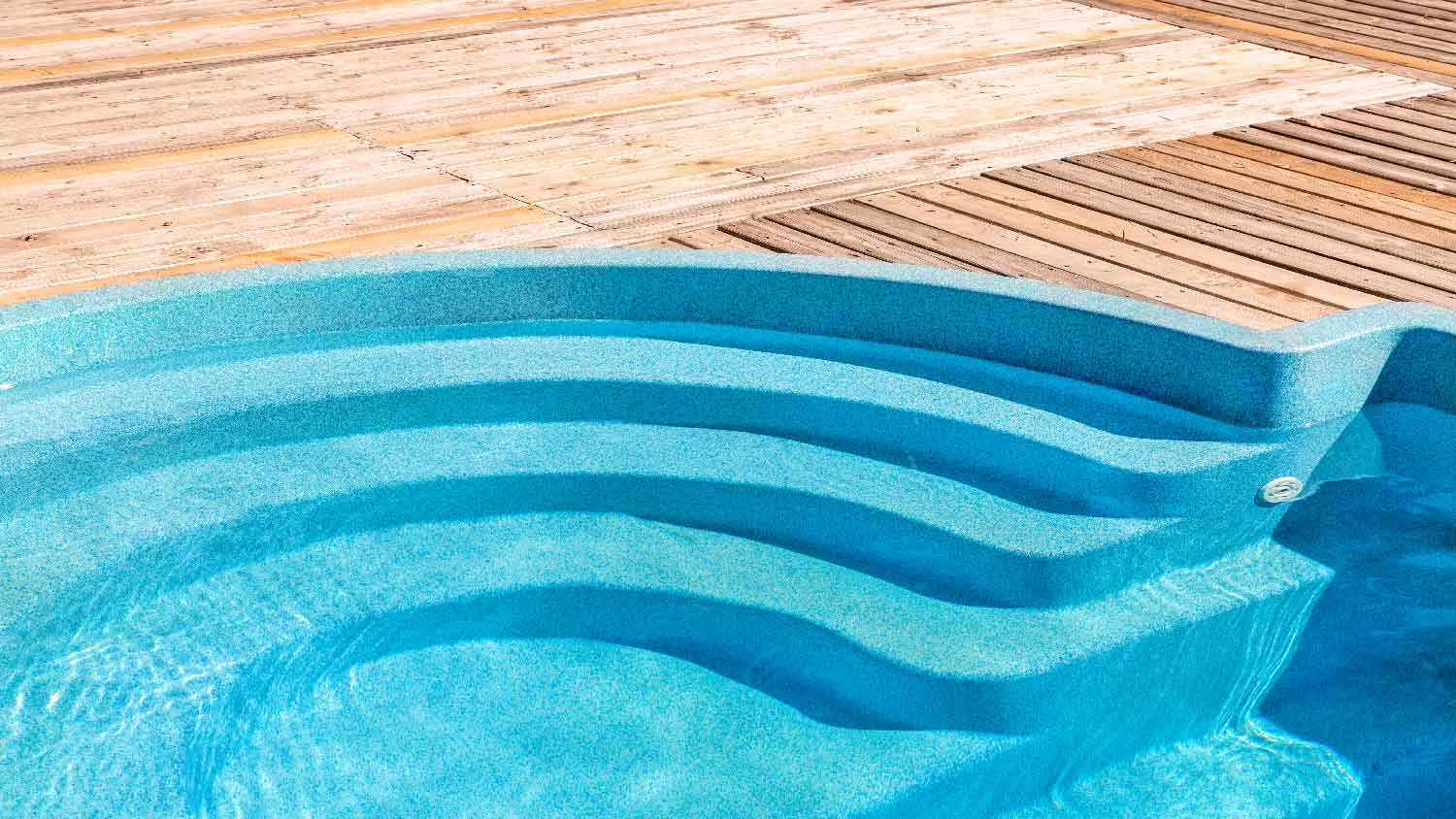
The smooth, non-porous quality of fiberglass doesn’t provide a lot of surface area where algae can build up, so you’ll do far less maintenance and cleaning than with a gunite pool. Gunite is rougher, which provides more surface area for algae, and it’s porous, which makes it harder to keep clean.
The smooth surface of fiberglass is more comfortable to walk on than gunite. Adults might not mind the rougher gunite material, but it can be uncomfortable for active children who play in the pool.
Homeowners deciding between a salt water vs. chlorine pool might worry that salt water will eat away at gunite over time and cause pitting. Fortunately, both types of pools stand up well to the effects of salt and chlorine.
Since gunite lasts so much longer than fiberglass, it tends to add more to your home value than a fiberglass pool. Additionally, a custom gunite pool with high-end pool finishes tends to improve the aesthetic of your yard more, providing a more impressive ROI.
From average costs to expert advice, get all the answers you need to get your job done.

A pool can help you cool off and relax, but it’s important to plan for in-ground pool costs in Los Angeles. Here are the factors that affect the cost.

A well-maintained pool can add significant value to your home, so why not dive into a remodel? This guide covers pool remodel costs in Los Angeles.
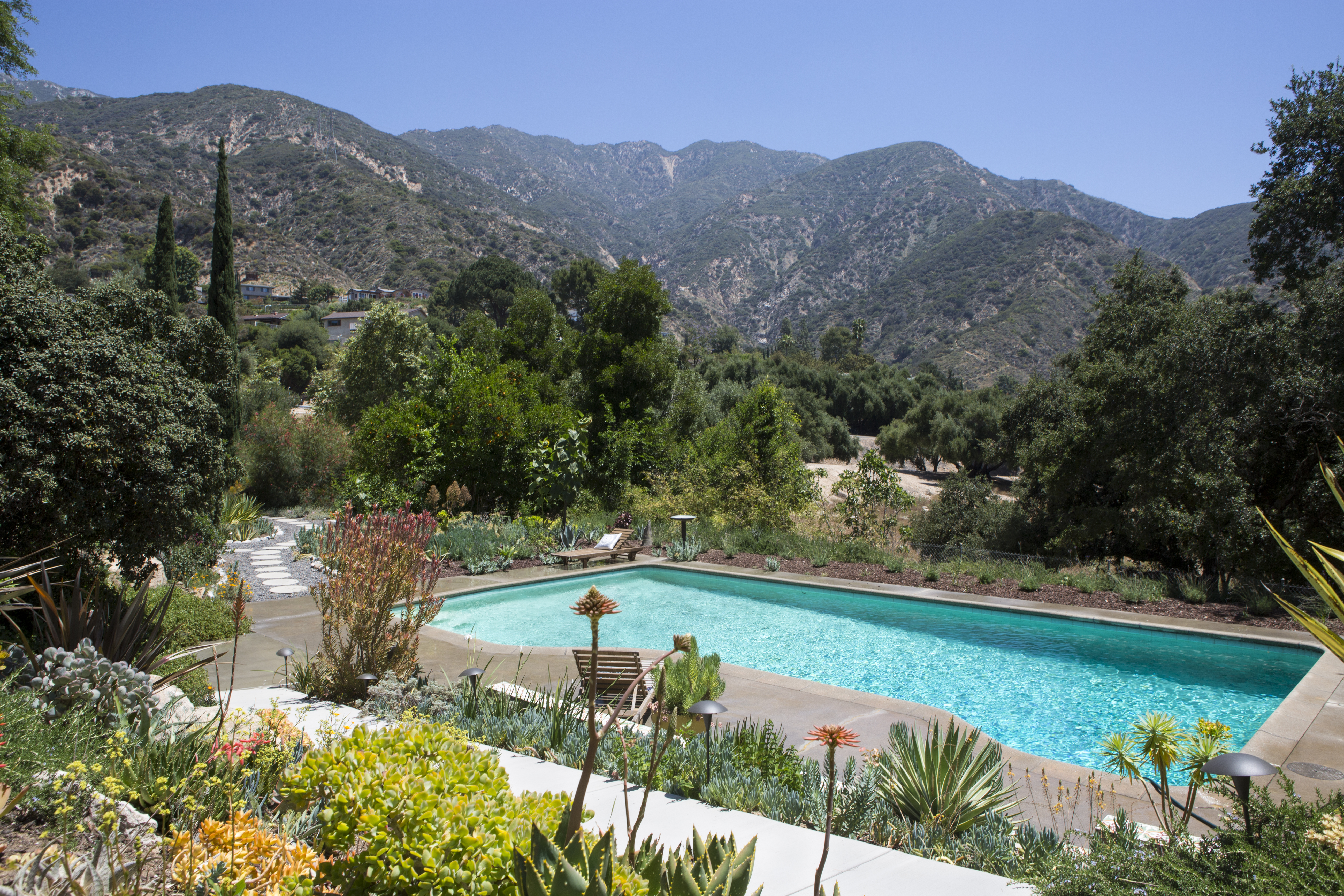
Pools are plentiful in California, but they require consistent maintenance and upkeep. This guide outlines pool liner replacement costs in Los Angeles.
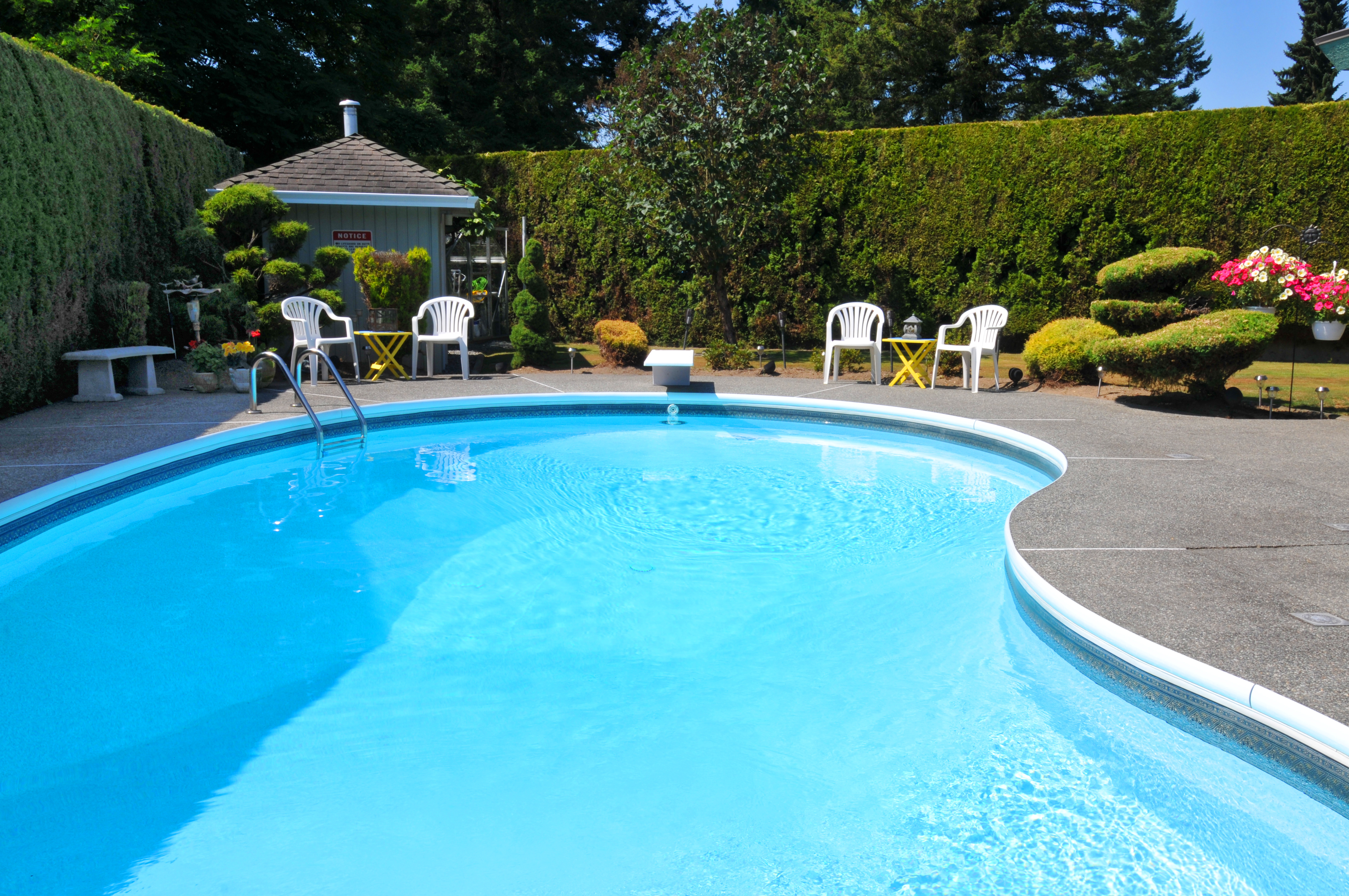
Discover the cost to install a solar pool heater, including average prices, key cost factors, and tips to save on your project.

Install a pool liner by draining the pool, removing the old liner, and laying the new one. Keep reading to learn how to install a pool liner like a pro.

Knowing how much salt to add to a pool will prepare it for use on a hot day. Use these calculations to keep your pool salt levels in the right spot.